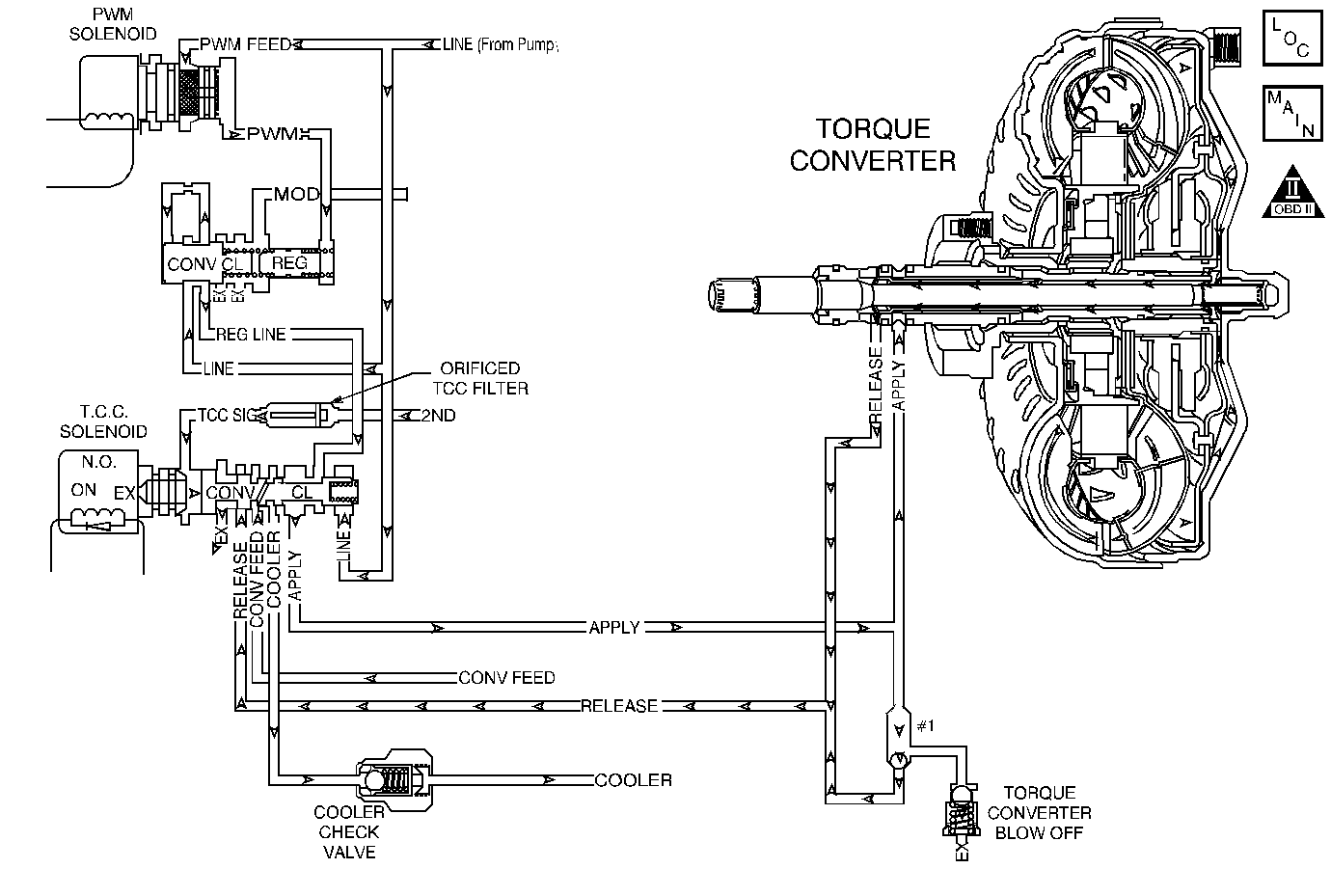
Circuit Description
The PCM energizes the Torque Converter Clutch Solenoid Valve (TCC Sol.
Valve) by creating a ground path on circuit 422. When grounded (energized),
the valve stops converter signal oil from exhausting. This causes converter
signal oil pressure to increase and move the TCC apply valve. The TCC
Sol. Valve Assy. de-energizes when the PCM no longer provides a ground
path. When de-energized, the valve will exhaust fluid and release the
TCC.
When the PCM detects 3 occurrences of TCC slip between -20 and +50 RPM
for 5 seconds, indicating the TCC is applied when commanded OFF, then DTC
P0742 sets. DTC P0742 is a type B DTC.
Conditions for Setting the DTC
| • | No TP DTCs P0122 or P0123. |
| • | No VSS DTCs P0502 or P0503. |
| • | No TCC PWM solenoid electrical DTC P1860. |
| • | No TCC enable solenoid electrical DTC P0740. |
| • | The engine speed is more than 500 RPM for 5 seconds. |
| • | The PCM has commanded the TCC OFF. |
| • | The commanded gear is not 1st. |
| • | The transmission gear indicates 2nd, 3rd or 4th. |
| • | The throttle angle is 14-50%. |
| • | The engine torque is 95-271 N·m (70-200 lb ft). |
| • | The TCC slip speed is -20 to +50 RPM, 3 occurrences for
5 seconds. |
| • | The engine speed is 800-4000 RPM. |
| • | The vehicle speed is 32-112 km/h (20-70 mph). |
| • | The speed ratio is 0.65-1.18. |
| • | The last gear range change occurred more than 3 seconds
ago. |
Action Taken When the DTC Sets
The PCM illuminates the Malfunction Indicator Lamp (MIL) during the
second consecutive trip in which the conditions for setting the DTC are met.
Conditions for Clearing the MIL/DTC
| • | The PCM turns OFF the MIL after three consecutive trips without
a failure reported. |
| • | A scan tool can clear the DTC from the PCM history. The PCM clears
the DTC from the PCM history if the vehicle completes 40 warm-up cycles without
a failure reported. |
Diagnostic Aids
| • | Check for PRNDL DTC P0705. DTC P0705 affects transmission operation.
This may set DTC P0742 falsely. |
| • | Inspect the transmission fluid for debris. |
Test Description
The number below refers to the step number on the diagnostic table.
-
A TCC slip speed, in the range shown, indicates that this DTC is current.
Refer to the Diagnostic Aids. Inspect for PRNDL DTC P0705.
DTC P0742 Torque Converter Clutch System Stuck ON
Step
| Action
| Value(s)
| Yes
| No
|
1
| Was the Powertrain On-Board Diagnostic (OBD) System Check
performed?
| --
|
Go to Step
2
| Go to
Powertrain On Board Diagnostic (OBD) System Check
|
2
|
- Install the Scan Tool
.
- Turn the ignition switch to the RUN position.
Important: Before clearing the DTCs, use the scan tool in order to record the Freeze
Frame and Failure Records for reference. The Clear Info function will erase
the data. Record the DTC Freeze Frame and Failure Records.
- Start and run the vehicle.
- Select TCC Slip Speed on the scan tool.
- With the transmission in D4, drive the vehicle through the 1-2
upshift.
In second gear is the TCC Slip Speed within the range specified?
| -20 to +50 RPM
|
Go to Step
3
| Go to Diagnostic Aids
|
3
| Inspect for the following conditions:
- The TCC apply valve stuck ON because of sediment or damage.
- The TCC Sol. Valve Assy. stuck ON because of sediment or damage.
Refer to Control Valve Body Assembly Inspection in Unit Repair.
Was a condition found and corrected?
| --
|
Go to Step 4
| --
|
4
| In order to verify your repair, perform the following procedure:
- Using the scan tool, clear DTCs.
- Operate the vehicle under the following conditions:
| • | The gear range is D2, D3 or D4. |
| • | The commanded gear is not 1st. |
| • | The engine speed is greater than 500 RPM for 5 seconds. |
| • | The engine torque is 95-270 N·m (70-200 lb ft). |
| • | The throttle position is 14-50%. |
| • | The PCM commands the TCC OFF. |
| • | The TCC slip speed is 150-2000 RPM for 5 seconds. |
| • | The engine speed is 800-4000 RPM. |
| • | The vehicle speed is 32-112 km/h (20-70 mph). |
| • | The speed ratio is 0.65-1.18. |
| • | The last gear change occurred more than 3 seconds ago. |
- Select Specific DTC. Enter DTC P0742.
Has the test run and passed?
| --
| System OK
|
Begin the diagnosis again. Go to Step 1
|

